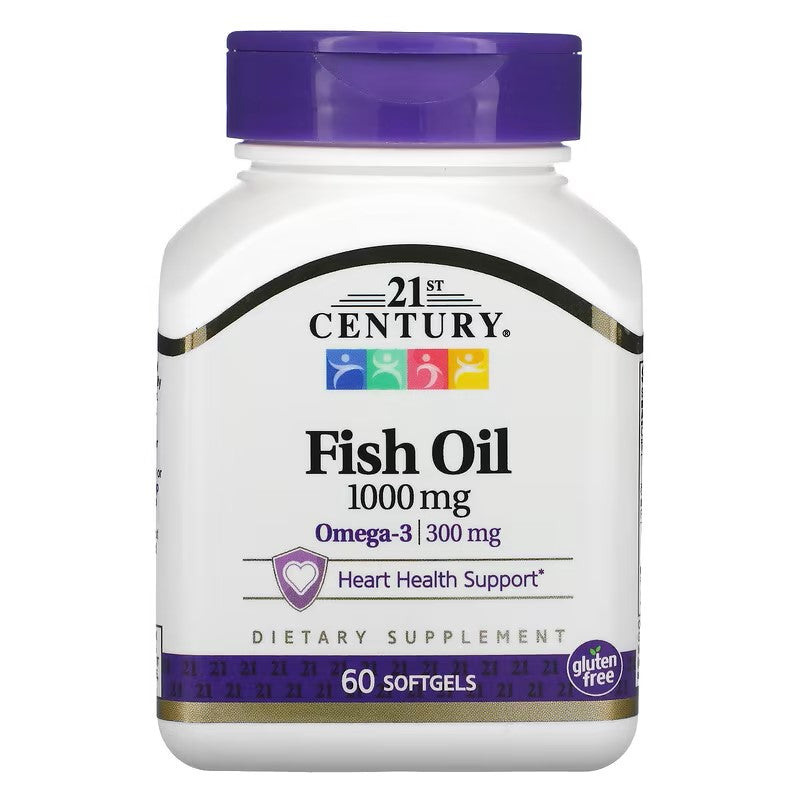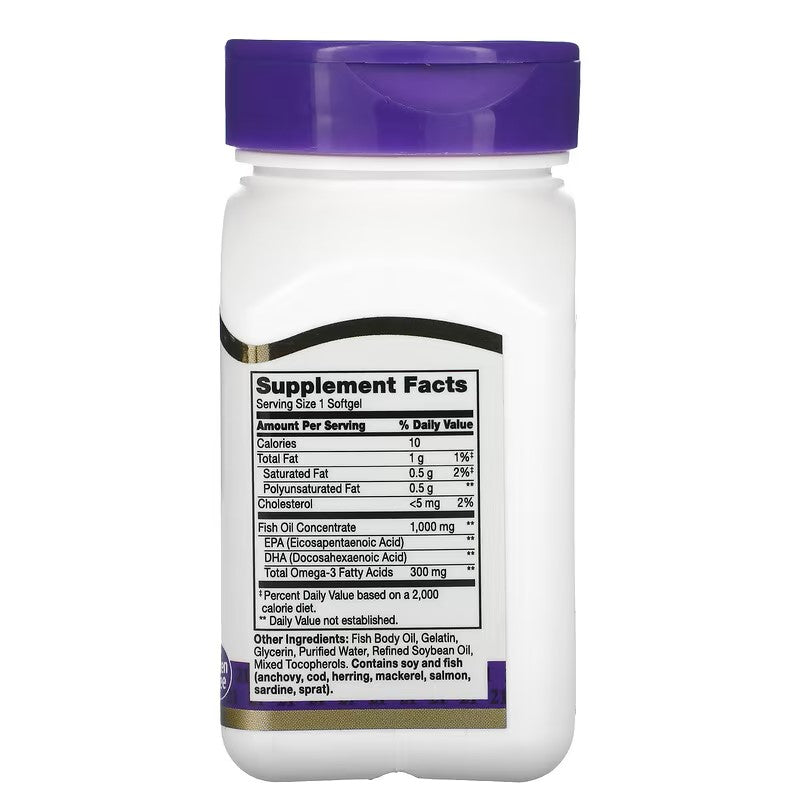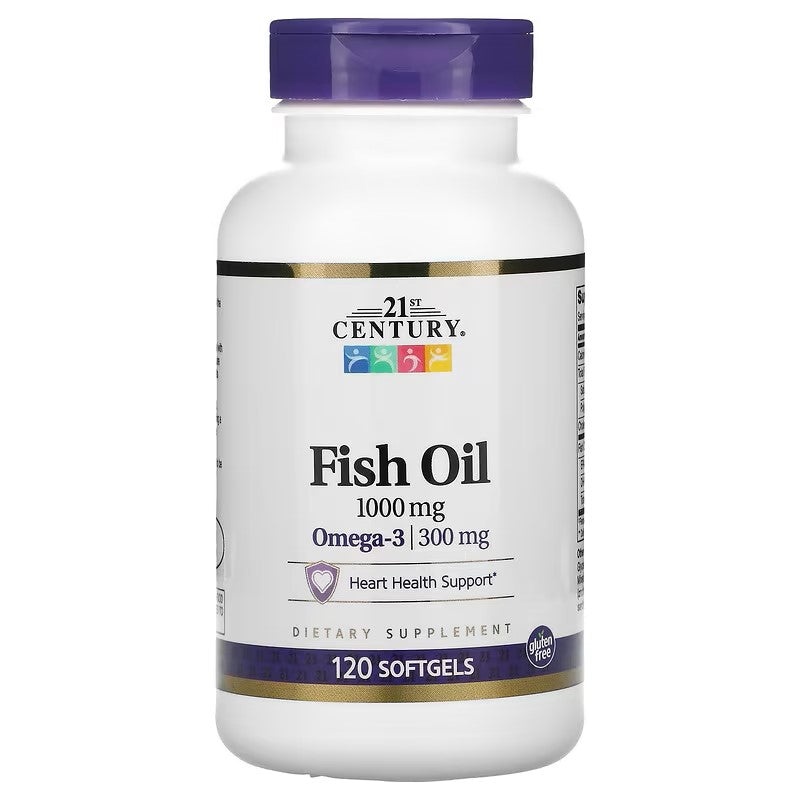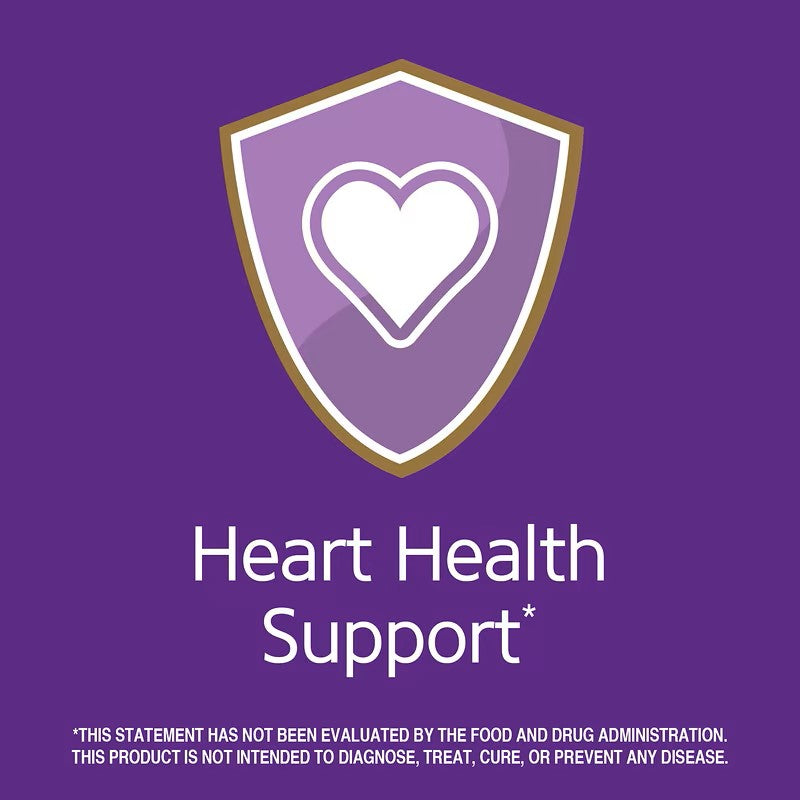Zenify Essence
21st Century, Fish Oil, 1,000 mg
21st Century, Fish Oil, 1,000 mg
Couldn't load pickup availability
100% Authentic!- Imported from USA
21st Century Fish Oil (1,000 mg) is a dietary supplement that provides essential omega-3 fatty acids, specifically EPA (eicosapentaenoic acid) and DHA (docosahexaenoic acid). These omega-3 fatty acids are known for their wide range of health benefits, particularly for heart, brain, and joint health. Here's a deeper look at the product and its benefits:
What is Fish Oil?
Fish oil is derived from the tissue of oily fish, such as salmon, mackerel, sardines, and herring. It’s rich in omega-3 fatty acids, which are considered essential fats because the body cannot produce them on its own and must obtain them from the diet or supplements.
Key Ingredients in 21st Century Fish Oil:
-
Fish Oil (1,000 mg):
- The primary ingredient in this supplement, which provides both EPA and DHA, the two most beneficial omega-3 fatty acids found in fish oil.
-
EPA (Eicosapentaenoic Acid):
- EPA is primarily known for its anti-inflammatory properties and is often used to support heart health. It helps reduce triglyceride levels, lower blood pressure, and may improve overall cardiovascular function.
-
DHA (Docosahexaenoic Acid):
- DHA is particularly important for brain and eye health. It supports cognitive function, memory, and may reduce the risk of cognitive decline, especially as people age. DHA is also a critical component of the retina in the eyes.
Potential Health Benefits:
-
Heart Health:
- One of the most well-known benefits of omega-3s is their ability to support cardiovascular health. Regular intake of fish oil has been shown to:
- Lower triglyceride levels (a type of fat in the blood that can increase the risk of heart disease).
- Reduce blood pressure, particularly in people with hypertension.
- Improve overall cholesterol levels, including increasing HDL (good cholesterol).
- Reduce the risk of heart disease, including the risk of heart attacks and strokes.
- One of the most well-known benefits of omega-3s is their ability to support cardiovascular health. Regular intake of fish oil has been shown to:
-
Brain Health and Cognitive Function:
- DHA is essential for brain health and has been linked to improved memory, focus, and cognitive function. It may help prevent age-related cognitive decline and diseases like Alzheimer's disease.
- Omega-3s, particularly DHA, are vital components of the brain's structure and function, playing a key role in maintaining healthy brain cells and communication between neurons.
-
Joint Health and Inflammation:
- EPA has strong anti-inflammatory effects, which can help reduce symptoms associated with inflammatory conditions such as rheumatoid arthritis. Fish oil may help reduce joint pain, stiffness, and swelling in individuals with arthritis.
-
Eye Health:
- DHA is a major structural component of the retina, and adequate levels of DHA are necessary for maintaining good vision. Fish oil may help reduce the risk of macular degeneration (a leading cause of blindness) and promote overall eye health.
-
Mental Health and Mood Support:
- Omega-3 fatty acids, especially EPA, have been shown to have a positive effect on mood and mental well-being. Fish oil may help alleviate symptoms of depression, anxiety, and other mood disorders. Some studies suggest that omega-3s may improve the effectiveness of antidepressant medications.
-
Skin Health:
- Fish oil's anti-inflammatory properties may help reduce skin conditions like eczema, psoriasis, and acne. It may also help maintain healthy, hydrated skin by supporting the skin barrier and reducing inflammation.
-
Pregnancy and Early Development:
- Omega-3s, particularly DHA, are critical for fetal brain and eye development during pregnancy. Adequate intake of DHA has been linked to better cognitive outcomes and visual development in infants.
-
Weight Management:
- Some research suggests that omega-3s may help with weight loss or fat reduction, particularly when combined with a healthy diet and exercise. They may support the reduction of fat around the abdominal area and help regulate metabolism.
How Does Fish Oil Work?
-
EPA and DHA work in several ways to benefit the body:
- Anti-inflammatory effects: Both omega-3 fatty acids help reduce inflammation by inhibiting the production of inflammatory molecules called eicosanoids.
- Cell membrane health: DHA, in particular, is a vital part of cell membranes in the brain and other tissues, influencing cell signaling and function.
- Blood flow and circulation: Omega-3s help prevent blood clots and support healthy blood vessel function, which is beneficial for heart and brain health.
Dosage:
- The standard dosage for 21st Century Fish Oil is typically 1,000 mg per capsule, which provides a balance of EPA and DHA (amounts may vary, so check the label for exact ratios).
- Typical Dosage: For general health benefits, the typical recommended dosage ranges from 1 to 3 capsules per day. Higher doses may be prescribed for specific health concerns (e.g., heart disease or high triglycerides), but it’s always best to consult with a healthcare provider before increasing the dosage.
Possible Side Effects:
Fish oil is generally safe for most people when taken at the recommended dosages, but some people may experience mild side effects, including:
- Fishy aftertaste or burps: Some people may experience fishy burps or an aftertaste when taking fish oil. Choosing a high-quality product with proper processing can help reduce this.
- Gastrointestinal issues: Some people may experience mild digestive issues, such as bloating, nausea, or diarrhea.
- Blood thinning: High doses of fish oil may increase the risk of bleeding by thinning the blood. People taking blood-thinning medications (like aspirin or warfarin) or those with bleeding disorders should consult a doctor before taking fish oil.
- Allergic reactions: Although rare, some people may have allergic reactions to fish oil, especially if they have a fish or shellfish allergy.
How to Take It:
- With meals: It’s best to take fish oil with food to help with absorption and minimize the chance of gastrointestinal upset. Taking it with a meal that contains healthy fats can also improve absorption.
- Consistency: To reap the maximum benefits of fish oil, it’s important to take it consistently over time.
Things to Keep in Mind:
- Quality matters: Choose a high-quality fish oil supplement that has been purified to remove contaminants like mercury, PCBs, and other toxins. Look for brands that provide a certificate of analysis or third-party testing.
- Consult a healthcare provider: If you are pregnant, breastfeeding, or taking any medications (especially blood thinners), it’s important to consult with your doctor before using fish oil supplements.
- Balanced diet: While supplements are helpful, fish oil is best when combined with a healthy, balanced diet. Eating fatty fish (like salmon or mackerel) regularly is also a great way to naturally obtain omega-3s.
21st Century Fish Oil (1,000 mg) is a well-known supplement that provides omega-3 fatty acids (EPA and DHA), which offer a wide range of health benefits, particularly for heart health, brain function, joint health, and skin health. Whether you're looking to support general wellness or target specific health issues, incorporating omega-3s into your routine can be beneficial. Always remember to check with a healthcare provider before starting any new supplement regimen to ensure it’s right for you.
Share











